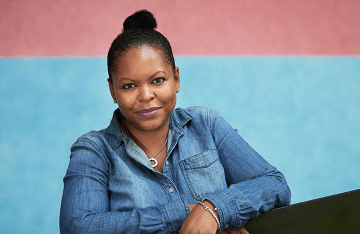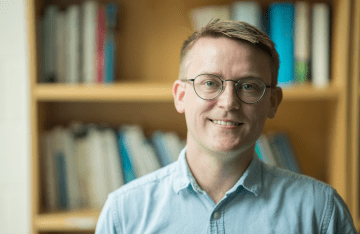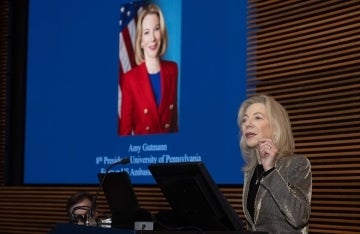Building Solidarity in the Anthropocene Symposium Videos Now Available
CARGC and CDCS are delighted to share video recordings of the month-long symposium that took place in April 2022.
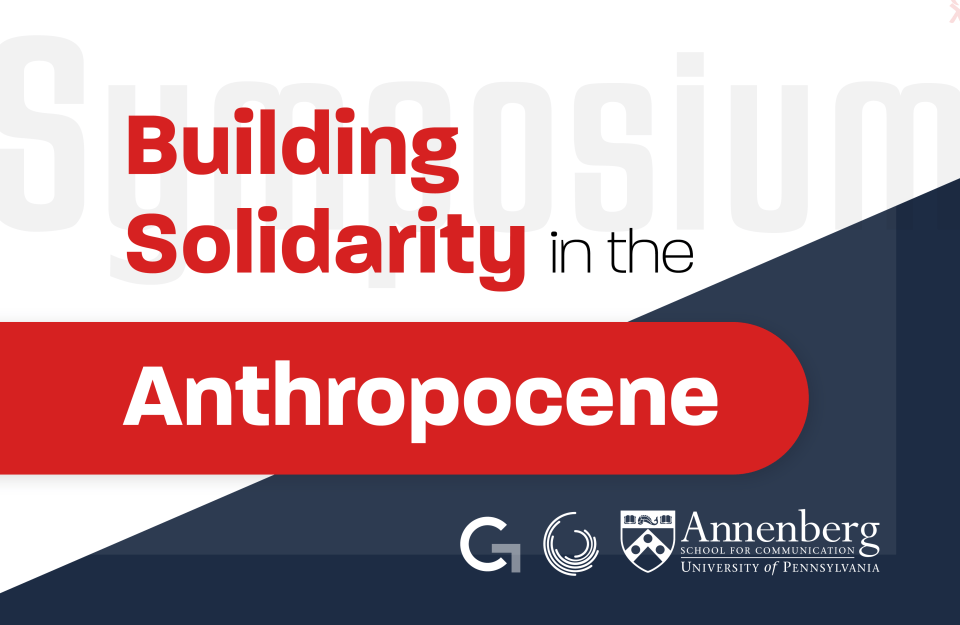
A virtual, month-long symposium co-organized by the Center for Advanced Research in Global Communication (CARGC) and the Center on Digital Culture and Society (CDCS) at the University of Pennsylvania’s Annenberg School for Communication brought together over twenty leading scholars, artists, and activists from around the world to collaboratively envision our shared futures amidst environmental crises.
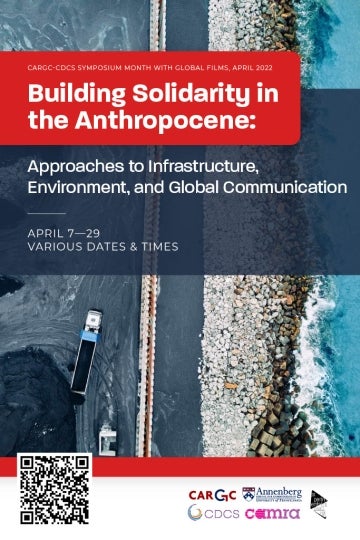
Oceans rise. Trees burn. Shales fracture. Mines pollute. Viruses spread. Cities under lockdown. Infrastructures attack. Ecologies go feral…. We are in an era where infrastructures and environments are ever closely intersected on a global scale. How to make sense of the different but intersecting logics, networks, and poetics of infrastructures and environments? What critical roles do media and mediation play in shaping the anthropocene, both in the Global South and North?
“Building Solidarity in the Anthropocene: Approaches to Infrastructure, Environment, and Global Communication,” a month-long virtual symposium held by the Center for Advanced Research in Global Communication (CARGC) and the Center on Digital Culture and Society (CDCS) and co-sponsored by Center of Experimental Ethnography (CEE) and Collective for Advancing Multimodal Research Arts (CAMRA) at the University of Pennsylvania, featured twenty-one scholars, artists, and activists from around the world to discuss how they address these important questions in their respective works. Through five roundtables and five global films, our invited speakers shared their research and multi-modal works from wide-ranging and multidisciplinary perspectives. The main topics of discussion included resource extraction, decolonial practices, politics of environment, urban infrastructure, environmental racism, trans-oceanic supply chains, and communication infrastructures amidst global health emergencies. We are delighted to share video recordings of the five symposium roundtables. Watch them if you missed the events in real-time or simply wish to revisit the series of insightful conversations with our eminent speakers.
Roundtable One - Environmental Racism and Infrastructure Injustice in the United States and Beyond
The opening roundtable featured Sindhu Thirumalaisamy, an artist and award-winning filmmaker; Daniel Armanios, BT Professor and Chair of Major Programme Management at the Saïd Business School and a Professorial Fellow of St. Anne’s College, both at the University of Oxford; Lance Freeman, Penn Integrates Knowledge (PIK) Professor of City and Regional Planning and Sociology at the University of Pennsylvania; Nikhil Anand, Associate Professor of Anthropology at the University of Pennsylvania, and our chair Kelly Diaz, a CDCS Doctoral Fellow and a Doctoral Candidate at the Annenberg School for Communication at the University of Pennsylvania. The panelists shared their insights and work on environmental racism and infrastructure injustice in cities in the U.S. and around the world.
Roundtable Two - Converging Across Oceans: Approaches to Logistics, Environment, and Power
The second roundtable explored the relational entanglements between supply chain logistics, environments, and media infrastructures on a global scale. The panel included Mythri Jegathesan, Associate Professor in the Department of Anthropology at Santa Clara University; Weixian Pan, Assistant Professor of Interactive Media Arts at NYU Shanghai and Global Network Assistant Professor at NYU; Ebony Coletu, Assistant Professor of African American Studies, English, and African Studies at Penn State University; and Nantina Vgontzas, a Postdoctoral Researcher at AI Now Institute. The discussion was chaired by Ayesha Omer, a CARGC Postdoctoral Fellow; Zoe (Mengyang) Zhao, a Doctoral Student at the Sociology Department and a CDCS Doctoral Fellow at the University of Pennsylvania; and Kinjal Dave, a Doctoral Student at the University of Pennsylvania’s Annenberg School for Communication and a CARGC Doctoral Fellow.
Roundtable Three - Emergency Infrastructures: The Experience of the Pandemic
The third symposium roundtable featured Melissa Tully, Associate Professor in the School of Journalism and Mass Communication at the University of Iowa; Eric Klinenberg, Professor of Sociology, Helen Gould Shepard Professor in Social Science, and Director of the Institute for Public Knowledge at NYU; Yingyi Ma, Associate Professor of Sociology and Director of Asian/Asian American Studies at Syracuse University; Andrew Lakoff, Professor of Sociology and Anthropology at the University of Southern California; and our chair Ali Karimi, a Postdoctoral Fellow at CARGC. The speakers discussed the pandemic responses from a global perspective, covering the experiences of both Global South and North.
Roundtable Four Part I - Reimagining Extractive Futures: Dispatches from Chile, Peehee mm’huh (Thacker Pass, Nevada), and Kalaallit Nunaat (Greenland)
This roundtable assembled community members, artists, and activists from sites where extraction—in the name of green and digital futures—is actively being imposed, negotiated, and resisted. Participants included Inuk Jørgensen, a filmmaker and activist from Narsaq in Kalaallit Nunaat (Greenland); Gary McKinney, a Western Shoshone-Paiute activist from Peehee mm’huh (Thacker Pass, Nevada), and Ramón Morales Balcázar, a coordinator of the Plurinational Observatory of Andean Salt Flats OPSAL and Ph.D. student in Rural Development at Universidad Autónoma Metropolitana. CARGC Fellows Zane Griffin Talley Cooper and Ingrid Burrington chaired the discussion and highlighted the threads of commonality in the struggles encountered by the speakers, and how these entwined threads can help build stronger networks of solidarity against the intersecting forces of extractivism, settler colonialism, and neoliberal capitalism.
Roundtable Four Part II - Environmental Art, Activism, and Decolonization
The fourth roundtable concluded with a dynamic conversation between T.J. Demos, Professor and Patricia and Rowland Rebele Endowed Chair in Art History and Visual Culture at the University of California, Santa Cruz, and founding Director of its Center for Creative Ecologies, and Melanie K. Yazzie, Assistant Professor of Native American Studies and American Studies at the University of New Mexico and Co-Founder of The Red Nation. Annenberg Postdoctoral Fellow Hanna E. Morris chaired the discussion which addressed the topics of environmental art, media, decolonization, The Red Deal, transnational movement-building against extractivism, and more.
Roundtable Five - Documentary Films for Imagining Futures: Celebration & Concluding Roundtable with Global Filmmakers
The concluding roundtable featured a conversation with the filmmakers who shared their films during the Symposium month. Each week of April, the CARGC-CDCS Symposium provided access to a different documentary film that explored relationships among technology, infrastructure, environment, and affected communities around the world. The final roundtable participants included Sindhu Thirumalaisamy, an artist and award-winning filmmaker from India; Ben Mendelsohn, Assistant Professor of Film and Digital Culture at Portland State University, United States; Zhao Liang, an independent documentary filmmaker from China; Inuk Jørgensen, a filmmaker and activist from Greenland; Esther Figueroa, a Jamaican independent filmmaker, and Mimi Sheller, a co-producer of our featured documentary and Professor of Sociology and the Dean of The Global School at the Worcester Polytechnic Institute, United States. The discussion was moderated by Alissa Jordan, Associate Director of the Center of Experimental Ethnography (CEE) at the University of Pennsylvania, and Kinjal Dave, CARGC Doctoral Fellow and Member of the Collective for Advancing Multimodal Research Arts (CAMRA) at the University of Pennsylvania. The CEE and CAMRA co-sponsored the global film series and closing roundtable of the CARGC-CDCS Symposium Month.

